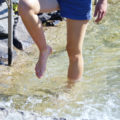Immune system

Now that it is significantly cooler outside and the wave of colds and flu is plaguing us, we should strengthen our immune system. In addition to a healthy diet, the immune system can be supported with a few simple measures. Sport and regular exercise, preferably in the fresh air, significantly strengthen the immune system. Studies show that active people catch colds far less often.
The wave of flu is in full swing and important medicines for children are now in short supply. Doctors are already warning of a delicate bottleneck in December. Anyone trying to get fever medicine for their sick toddler these days has a problem: Syrups and suppositories with the active ingredients ibuprofen or paracetamol are only sporadically available nationwide.
Painkillers suitable for children with the active ingredient ibuprofen can apparently not be ordered at the moment. Against the background of the flu season, which according to the Robert Koch Institute is currently gaining momentum, this could become a problem.
Doctors are already very worried about the period from Christmas onwards, as the wave of flu comes rolling in. Cough syrup, electrolyte solutions and certain antibiotics are also currently difficult to obtain, according to doctors and pharmacists.
According to the definition of the Robert Koch Institute (RKI), the wave of flu has already begun. Even though there have been recent warnings of a severe wave now looming: The RKI and other experts emphasise that the course of the disease cannot be predicted. However, according to the RKI, it is “conceivable” that an increased proportion of the population could be susceptible to the pathogens, as stated on the institute’s website.
“The number of deaths can vary greatly in the individual waves of flu, from several hundred to over 25,000 in the 2017/18 season”, notes the RKI. In Germany, flu vaccination is recommended for people over 60, pregnant women, chronically ill people, residents of old people’s homes and nursing homes and people at increased occupational risk.
According to the RKI, the number of infections during a wave of flu is estimated at five to 20 percent of the population, which corresponds to around four to 16 million people in Germany. Experts believe a so-called twindemic (twin wave) is possible – the joint occurrence of corona and influenza.
The predictive health analysis agency Airfinity has calculated that there could be around 18,000 simultaneous hospitalisations for Covid-19 and influenza at peak times early next year if the flu season is as severe as 2017/2018.
Prevention – Strengthen your immune system
If you want to prevent an infection with bacteria or viruses, you should strengthen your immune system. For example, zinc, vitamin C, vitamin D, green tea, ginger tea, cold facial showers, moist air – and singing protect against a cold, according to the NDR.
Let’s take a closer look: Why should zinc help? Zinc is said to be important for the immune system to form antibodies against pathogens, zinc is of great importance for the entire metabolism. It strengthens the immune system and is involved in cell growth.
After contact with a pathogen, a high dose of zinc (about 100 milligrams per day) can still prevent infection in some cases. The best sources of zinc are fruits like avocado with 0.64 mg per 100 g, dried figs with 0.55 mg, raspberries with 0.42 mg, and berries like blackberries with 0.53 mg. Bananas have slightly less with 0.15 mg and peaches with 0.17 mg. Fish, meat, dairy products and legumes also contain a particularly large amount of zinc.
Oats are also a significant zinc supplier: They contain 3.9 mg of zinc per 100 g, which is 39% of the reference amount for the daily intake of an adult. However, the body absorbs zinc more easily from animal foods than from plant sources.
Vitamin C against colds?
200 milligrams of vitamin C per day can weaken or shorten a cold. If taken after the onset of cold symptoms, however, vitamin C does not shorten the duration of the cold. A lot of vitamin C is contained in citrus fruits, for example, but taking vitamin C daily as a preventive measure cannot protect most people from colds. If the cold is already there, vitamin C has no effect on the cold. The recommended vitamin C intake for men is 110 mg/day and for women 95 mg/day. The recommended amount for pregnant women is 105 mg, and for breastfeeding women 125 mg per day.
Ginger tea kills the viruses in the throat
No wonder: Ginger has natural healing powers. Anyone who notices a sore throat can kill viruses with ginger tea – and thereby relieve the immune system of some of its work. This is because the gingerols contained in ginger tea activate the macrophages. Macrophages are the so-called “scavenger cells” of the immune system and are responsible for the destruction of invading viruses, bacteria and toxins as well as other pathogens. In the case of ginger, it is known that it has a certain effect against rhinoviruses, i.e. cold viruses. It is not pronounced, but it has been described. It is therefore conceivable that ginger has a local effect. The spicy root is one of the most popular home remedies to combat colds and sore throats. Ginger tea has an expectorant, anti-inflammatory and warming effect. Only if you are sensitive to spiciness should you not drink ginger tea.
Green tea can fight viruses in the mouth
Gargling with green tea is used in Chinese medicine to treat pathogens in the mouth. Green tea is good at actively fighting invading viruses. The cause is the tannins in green tea, which kill viruses in the mouth. Green tea also contains vitamin A, vitamin B and vitamin B12, and is also said to reduce the risk of cardiovascular disease.
The question of whether green tea helps with a cold can be answered with a yes, because it also relieves coughs and runny noses. Green tea also helps to lower cholesterol and also improve the ratio of “good” (HDL) to “bad” (LDL) cholesterol by reducing LDL levels.
Vitamin D: Compensate for the deficiency
A vitamin D deficiency can also lead to an increased susceptibility to infections. The cause is often too little sunlight in autumn and winter, as the body cannot produce vitamin D without sun. At least 30 percent of German people have too little vitamin D in their blood during the autumn and winter months. Vitamin D deficiency can cause fatigue, mood swings and cold symptoms.
A long-term vitamin D deficiency can be harmful to the health because the body needs the vitamin to incorporate calcium from food into bones and teeth. In winter, when the sun is low in the sky and the angle of incidence of the radiation is only around 45 degrees, there is almost no vitamin D production in the skin. Taking vitamin D tablets can be helpful and boost the immune system.
Our advice to you: Get out in the fresh air a lot in autumn and winter. In addition, the mucous membrane is often dried out in winter due to dry air. This hinders the immune cells at work. Lots of exercise in the fresh air is therefore important: This moistens the mucous membrane and dilates the blood vessels – the immune system becomes active and the risk of catching a cold is reduced.
Singing: Therapy for more antibodies
And now we come to a special piece of advice from the NDR.
Singing as therapy not only puts you in a good mood, but can also strengthen the immune system. Choir singers have been shown to have robust and strengthened airways – and increased antibodies in their saliva after singing. But you don’t have to join a choir now. Singing vigorously in the shower or on a walk in the woods should do the trick.
And if you do catch a cold, rest and relaxation, cold baths, throat compresses for sore throats, calf compresses for fever, inhalation for coughs and nasal irrigation for colds will help.
These were our tips on how to strengthen your immune system. But if you want to be on the safe side, a flu vaccination is the best thing. The likelihood of catching a cough, runny nose or other infection is very high this autumn and winter. It should also be remembered that the danger from the corona virus has not yet disappeared.
Stay healthy!
Sources:
RKI
NDR.de
Zentrum der Gesundheit
br.de
deutsche-apotheker-zeitung.de




